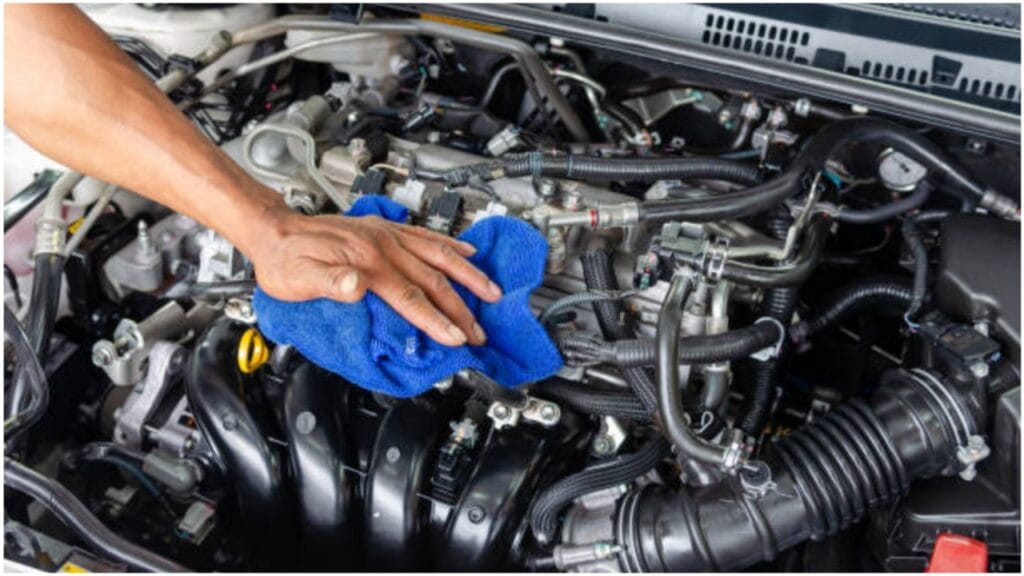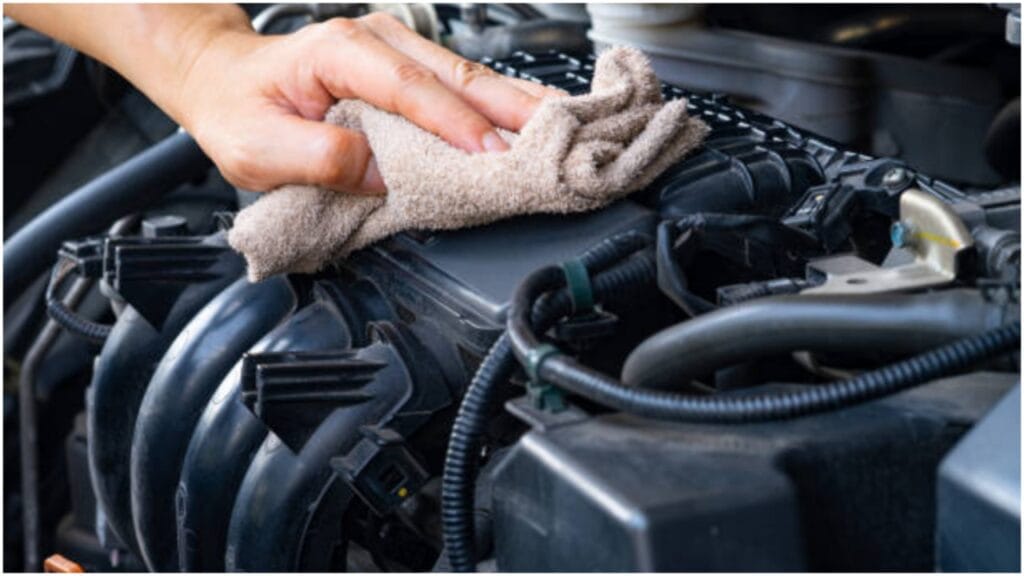Use a dry or soft detailing brush to loosen dirt, grease, and debris. Focus on tight corners and areas with stubborn grime. Once loosened, wipe everything down with a microfiber cloth. For heavier grease spots, use an engine-safe degreaser or a cleaning spray made explicitly for dry cleaning.
Spray lightly onto the dirty areas and let it sit for a few minutes. Then, gently scrub with a brush or wipe with a cloth. Compressed air is another excellent tool for blowing away loose dust and debris. It gets into hard-to-reach spots without any risk of moisture.
Lastly, finish with a clean microfiber cloth to buff and shine surfaces. Let’s learn more details that will give you a better idea of how to clean the engine bay without water.
Start With a Good Inspection
Before you do anything, take a good look. Stand in front of the engine bay and examine it. What are you working with? Is a lot of grime caked onto the surfaces, or is it just a little dusty? Knowing the state of things will help you figure out the best approach.
Grab Some Basic Tools
You’ll need a few essential tools. No fancy gadgets here, just simple, straightforward stuff: a brush (preferably a soft one), a microfiber cloth, some degreaser (non-water-based is ideal), and a vacuum with an attachment.
The brush will help you get into tight spots, the microfiber cloth is perfect for wiping down surfaces without leaving lint, and the vacuum will help suck up debris, dirt, and even some dust.
Protect the Sensitive Parts
Now, here’s where we start to make a real difference. Before diving in with your brush, protecting some of the sensitive electrical components is crucial.
Think of things like the alternator, battery, and fuse boxes. Covering these parts with plastic bags or something similar is always a good idea, even if you’re not using water.
You might not use water, but that doesn’t mean dirt and grime won’t fly around. Covering these areas ensures no unwanted stuff gets inside where it could cause trouble.
Degrease the Engine

Here’s the fun part: Grab your degreaser and spray it onto the grimy areas. You don’t need to go overboard; a light mist will loosen up the grease.
Let it sit for a minute, but don’t let it dry out. The idea here is to soften the grime so you can lift it away without too much effort.
This step is where patience pays off. You don’t want to rush it. After you’ve applied the degreaser, take your brush and gently scrub away the dirt.
Use a Microfiber Cloth for the Final Touches
Once the degreaser has worked, take your microfiber cloth and wipe things down. You don’t need to scrub this time—wipe. Use smooth, gentle motions to catch any remaining dirt and grease.
Remember, microfiber is your best friend here. Unlike regular rags, it grabs onto dirt and grime without leaving behind lint. Plus, it helps you get a nice, shiny finish.
Vacuum Away Debris
Engines collect a surprising amount of dust and debris, especially in hard-to-reach places. That’s where your vacuum comes in.
Start with the attachment and gently suck up any debris in corners, crevices. If you’ve got a blow nozzle on your vacuum, great! Use it to blast out any loose dirt from hard-to-reach places. Just be cautious not to blow debris onto sensitive parts, like your air filter.
Optional: Use a Detailer Spray
This step isn’t mandatory, but if you want to add a bit of shine, you can finish your engine cleaning with a detailer spray. These sprays are formulated to give your engine bay a glossy finish without attracting dirt.
Why It’s Better to Avoid Water
Water can get into places you don’t want it—like the electrical components, the battery terminals, or the air intake. Those things don’t appreciate water, and neither does your engine.
Water can also cause rust, especially if you don’t dry everything off properly. And let’s not forget that engines are hot.
Have you ever tried spraying water on a hot engine? It’s messy and can cause damage, such as warping metal parts or cracking plastic.
By skipping water, you reduce the risk of damage and avoid creating an unnecessary mess.
Keep It Regular

Cleaning your engine bay without water isn’t a one-time thing. To keep things looking neat and functioning well, try to do it regularly. It doesn’t have to be every week, but once a month or every couple of months will help maintain your engine’s health and appearance.
FAQ’s
What happens if you spray water on your engine?
Spraying water directly on your engine might seem like a quick way to clean it, but it’s risky. First, water can get into sensitive parts like the electrical components, alternator, and battery terminals.
These parts aren’t designed to handle moisture or water; water can cause corrosion or even short circuits. The wires and connectors might start to corrode, leading to electrical issues or complete failure.
Water can also seep into your engine’s air intake, which is a big problem. Water entering the engine can lead to hydro lock—a dangerous situation where water enters the cylinders, preventing the engine from turning over. This can cause severe damage.
Even if you avoid all the delicate parts, water can create other problems. Engines are usually hot, and spraying water can cause thermal shock. Sudden temperature changes can crack plastic parts or warp metal components.
Water left in hidden corners can also lead to rust. Moisture creates a perfect environment for corrosion, especially in places that are hard to dry.
Another thing to consider is how water affects grease and oil. When spraying water on your engine, you might wash away some protective lubricants. These are there to keep your engine running smoothly and prevent wear. Without them, parts could wear down faster.
So, while water may seem like an easy fix, it’s not the best option. The potential for damage is high, and the risks far outweigh the benefits. Cleaning your engine with dry methods is safer and often more effective.
How to clean your engine no water no scrubbing?
Cleaning your engine without water or scrubbing is easier than it sounds. Cover sensitive parts like the battery and electrical components with plastic bags. Then, use an air compressor or a blower to blast loose dirt and debris away.
The powerful air will blow out dust from hard-to-reach spots without damaging anything. Next, grab a non-water-based degreaser and spray it onto the greasy areas.
Let it sit for a few minutes to break down the grime. After that, use a microfiber cloth to wipe down the surfaces.
The cloth will pick up dirt without leaving lint behind. You can also use a vacuum with attachment to suck up any remaining debris from corners and crevices.
Apply a plastic or rubber cleaner to any exposed surfaces for extra shine. This will restore the look of your engine and protect it from future buildup.
What is the best homemade engine cleaner?
A tremendous homemade engine cleaner is a mix of baking soda and dish soap. Start by combining two tablespoons of baking soda with a few drops of dish soap in a spray bottle.
Fill the bottle with warm water and shake it gently to mix. Baking soda is a mild abrasive that helps lift grease and grime, while dish soap breaks down oils and dirt.
This solution is gentle enough for your engine but tough on stains. Spray it on the dirty areas, let it sit for a few minutes, and then wipe it off with a microfiber cloth. For stubborn spots, you can use a soft brush to scrub away the grime gently.
Homemade heavy duty engine degreaser?
Mix equal parts of degreasing dish soap, white vinegar, and water to make a homemade heavy-duty engine degreaser. The dish soap helps break down grease, the vinegar cuts through tough grime, and the water dilutes it to make it easier to apply.
If you want extra power, add a tablespoon of baking soda. It boosts the solution’s ability to lift grease and dirt. Shake the mixture well before use, then apply it to the greasy areas of your engine with a spray bottle. Let it sit for 10–15 minutes to break down the buildup.
Then, use a stiff brush to scrub away any tough spots. You may need to repeat the process for deep stains or heavy grease. Once done, wipe everything down with a microfiber cloth and dry it off with a clean towel. This homemade degreaser is tough on grease but gentle on your engine, saving you the hassle and expense of store-bought cleaners.
Conclusion
Cleaning your engine bay without water isn’t just possible; it’s the best way. You’ll preserve the delicate parts of your engine, avoid rust, and save yourself time and hassle in the process. With the right tools, patience, and technique, your engine bay will look as good as new—and you’ll avoid the usual mess.

